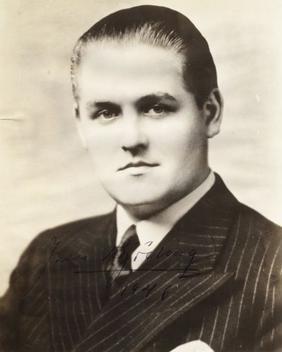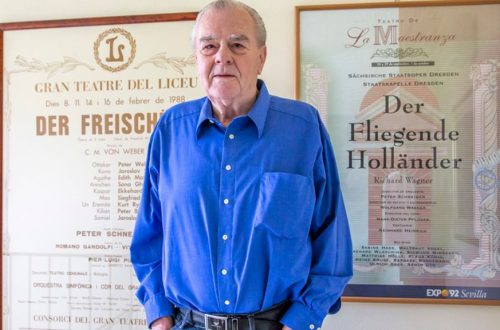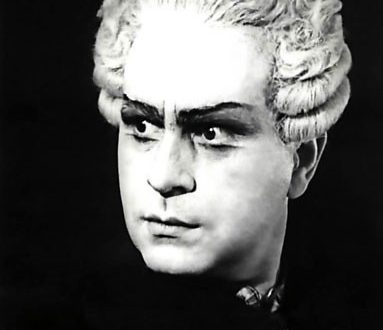
Jussi Björling |
Jussi Björling
Swede Jussi Björling was called by critics the only rival of the great Italian Beniamino Gigli. One of the most remarkable vocalists was also called “beloved Jussi”, “Apollo bel canto”. “Björling had a voice of really extraordinary beauty, with distinct Italian qualities,” notes V.V. Timokhin. “His timbre conquered with amazing brightness and warmth, the sound itself was distinguished by rare plasticity, softness, flexibility and at the same time was rich, juicy, fiery. Throughout the entire range, the artist’s voice sounded even and free – his upper notes were brilliant and sonorous, the middle register captivated with sweet softness. And in the very performing manner of the singer one could feel the characteristic Italian excitement, impulsiveness, cordial openness, although any kind of emotional exaggeration was always alien to Björling.
He was a living embodiment of the traditions of Italian bel canto and was an inspired singer of its beauty. Those critics who rank Björling among the pleiad of famous Italian tenors (such as Caruso, Gigli or Pertile) are absolutely right, for whom the beauty of chant, the plasticity of sound science, and love for the legato phrase are integral features of the performing appearance. Even in works of the veristic type, Björling never strayed into affectation, melodramatic strain, never violated the beauty of a vocal phrase with a chanting recitation or exaggerated accents. From all this it does not follow at all that Björling is not a temperamental enough singer. With what animation and passion his voice sounded in the brightly dramatic scenes of operas by Verdi and composers of the veristic school – whether it was the finale of Il trovatore or the scene of Turiddu and Santuzza from Rural Honor! Björling is an artist with a finely developed sense of proportions, the inner harmony of the whole, and the famous Swedish singer brought great artistic objectivity, a concentrated narrative tone to the Italian style of performance with its traditionally emphasized intensity of emotions.
The very voice of Björling (as well as the voice of Kirsten Flagstad) has a peculiar shade of light elegiacism, so characteristic of northern landscapes, the music of Grieg and Sibelius. This soft elegiacity gave a special touching and soulfulness to the Italian cantilena, lyrical episodes that Björling sounded with a bewitching, magical beauty.
Yuhin Jonatan Björling was born on February 2, 1911 in Stora Tuna into a musical family. His father, David Björling, is a fairly well-known singer, a graduate of the Vienna Conservatory. The father dreamed that his sons Olle, Jussi and Yesta would become singers. So, Jussi received his first singing lessons from his father. The time has come when the early widowed David decided to take his sons to the concert stage in order to feed his family, and at the same time introduce the guys to music. His father organized a family vocal ensemble called the Björling Quartet, in which little Jussi sang the soprano part.
These four performed in churches, clubs, educational institutions throughout the country. These concerts were a good school for future singers – the boys from an early age were accustomed to consider themselves artists. Interestingly, by the time of the performance in the quartet, there are recordings of a very young, nine-year-old Jussi, made in 1920. And he began to record regularly from the age of 18.
Two years before his father had died, Jussi and his brothers had to make do with odd jobs before they could fulfill their dream of becoming professional singers. Two years later, Jussi managed to enter the Royal Academy of Music in Stockholm, in the class of D. Forsel, then head of the opera house.
A year later, in 1930, Jussi’s first performance took place on the stage of the Stockholm Opera House. The young singer sang the part of Don Ottavio in Mozart’s Don Giovanni and had great success. At the same time, Björling continued his studies at the Royal Opera School with the Italian teacher Tullio Voger. A year later, Björling becomes a soloist with the Stockholm Opera House.
Since 1933, the fame of a talented singer has spread throughout Europe. This is facilitated by his successful tours in Copenhagen, Helsinki, Oslo, Prague, Vienna, Dresden, Paris, Florence. The enthusiastic reception of the Swedish artist forced the directorate of theaters in a number of cities to increase the number of performances with his participation. The famous conductor Arturo Toscanini invited the singer to the Salzburg Festival in 1937, where the artist performed the role of Don Ottavio.
In the same year, Björling performed successfully in the USA. After the performance of the solo program in the city of Springfield (Massachusetts), many newspapers brought reports about the concert to the front pages.
According to theater historians, Björling became the youngest tenor with whom the Metropolitan Opera has ever signed a contract to perform in leading roles. On November 24, Jussi stepped onto the stage of the Metropolitan for the first time, making his debut with the party in the opera La bohème. And on December 2, the artist sang the part of Manrico in Il trovatore. Moreover, according to critics, with such “unique beauty and brilliance”, which immediately captivated the Americans. That was the true triumph of Björling.
V.V. Timokhin writes: “Björling made his debut on the stage of London’s Covent Garden Theater in 1939 with no less success, and the 1940/41 season at the Metropolitan opened with the play Un ballo in maschera, in which the artist sang the part of Richard. By tradition, the theater administration invites singers who are especially popular with listeners to the opening of the season. As for the mentioned Verdi opera, it was last staged in New York almost a quarter of a century ago! In 1940, Björling performed for the first time on the stage of the San Francisco Opera (Un ballo in maschera and La bohème).
During the Second World War, the singer’s activities were limited to Sweden. As early as 1941, the German authorities, aware of Björling’s anti-fascist sentiments, refused him a transit visa through Germany, necessary for a trip to the United States; then his tour in Vienna was canceled, as he refused to sing in German in “La Boheme” and “Rigoletto”. Björling performed dozens of times in concerts organized by the International Red Cross in favor of the victims of Nazism, and thus won special popularity and appreciation from thousands of listeners.
Many listeners got acquainted with the work of the Swedish master thanks to the recording. Since 1938 he has been recording Italian music in the original language. Later, the artist sings with almost equal freedom in Italian, French, German and English: at the same time, the beauty of the voice, vocal skill, accuracy of intonation never betray him. In general, Björling influenced the listener primarily with the help of his richest in timbre and unusually flexible voice, almost without resorting to spectacular gestures and facial expressions on stage.
The post-war years were marked by a new rise of the artist’s mighty talent, bringing him new signs of recognition. He performs in the largest opera houses in the world, gives many concerts.
So, in the 1945/46 season, the singer sings at the Metropolitan, tours on the stages of the opera houses in Chicago and San Francisco. And then for fifteen years, these American opera centers regularly host the famous artist. At the Metropolitan Theater since that time, only three seasons have passed without the participation of Björling.
Becoming a celebrity, Björling did not break, however, with his native city, continued to perform regularly on the Stockholm stage. Here he shone not only in his crowning Italian repertoire, but also did a lot to promote the work of Swedish composers, performed in the operas The Bride by T. Rangstrom, Fanal by K. Atterberg, Engelbrecht by N. Berg.
The beauty and strength of his lyrical-dramatic tenor, purity of intonation, crystal clear diction and impeccable pronunciation in six languages have literally become legendary. Among the highest achievements of the artist, first of all, are the roles in the operas of the Italian repertoire – from the classics to the verists: The Barber of Seville and William Tell by Rossini; “Rigoletto”, “La Traviata”, “Aida”, “Trovatore” by Verdi; “Tosca”, “Cio-Cio-San”, “Turandot” by Puccini; “Clowns” by Leoncavallo; Rural Honor Mascagni. But along with this, he and the excellent Belmont in The Abduction from the Seraglio and Tamino in The Magic Flute, Florestan in Fidelio, Lensky and Vladimir Igorevich, Faust in Gounod’s opera. In a word, Björling’s creative range is as wide as the range of his powerful voice. In his repertoire there are more than forty opera parts, he has recorded many dozens of records. In concerts, Jussi Björling periodically performed with his brothers, who also became fairly well-known artists, and occasionally with his wife, the talented singer Anne-Lisa Berg.
Björling’s brilliant career ended at its zenith. Signs of heart disease began to appear already in the mid-50s, but the artist tried not to notice them. In March 1960, he suffered a heart attack during a London performance of La bohème; the show had to be cancelled. However, barely recovering, Jussi reappeared on stage half an hour later and after the end of the opera was awarded an unprecedented standing ovation.
Doctors insisted on long-term treatment. Björling refused to retire, in June of the same year he made his last recording – Verdi’s Requiem.
On the 9th of August he gave a concert in Gothenburg, which was destined to be the last performance of the great singer. Arias from Lohengrin, Onegin, Manon Lesko, songs by Alven and Sibelius were performed. Björling died five weeks later on September 1960, XNUMX.
The singer did not have time to implement many of his plans. Already in the fall, the artist was planning to participate in the renewal of Puccini’s opera Manon Lescaut on the stage of the Metropolitan. In the capital of Italy, he was going to complete the recording of Richard’s part in Un ballo in maschera. He never recorded the part of Romeo in Gounod’s opera.





